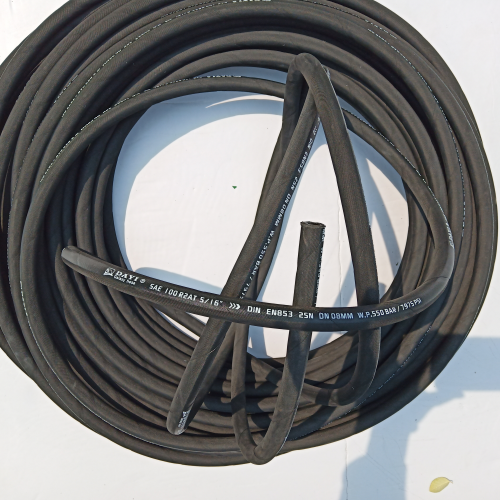335345435
Oct . 18, 2024 19:09 Back to list
Durable Flexible PTFE Hose Solutions for Diverse Industrial Applications
The Versatile Applications of Flexible PTFE Hose
In the world of industrial applications, hoses play a vital role in transporting fluids, gases, and other substances from one point to another. Among the variety of hoses available today, flexible polytetrafluoroethylene (PTFE) hoses have gained considerable attention due to their unique properties and versatility. This article explores the features, benefits, and applications of flexible PTFE hoses, highlighting their importance in various industries.
What is PTFE?
Polytetrafluoroethylene (PTFE) is a high-performance fluoropolymer that is best known for its remarkable resistance to heat, chemicals, and moisture. It is commonly recognized by the brand name Teflon, popularized by its use in non-stick cookware. However, PTFE's applications extend far beyond the culinary realm. In industrial settings, PTFE is used for making hoses that can withstand extreme conditions, making it an invaluable material in many sectors.
Key Properties of Flexible PTFE Hose
1. Chemical Resistance One of the most significant advantages of PTFE hoses is their exceptional chemical resistance. They can handle a wide range of aggressive substances, including acids, bases, solvents, and even some gases. This property makes them ideal for industries like chemical processing, pharmaceuticals, and food production, where contamination and corrosion can be serious concerns.
2. Temperature Tolerance Flexible PTFE hoses can operate effectively in extreme temperature ranges, from -100°F (-73°C) to 500°F (260°C). This impressive thermal stability allows them to be used in applications such as hot water transfer, steam services, and high-temperature industrial processes.
3. Low Friction Coefficient PTFE has one of the lowest coefficients of friction among solids, making flexible PTFE hoses easy to handle and reducing wear on fittings and accessories. This property enhances flow performance, making these hoses suitable for applications requiring smooth and consistent fluid movement.
4. Flexibility and Durability Despite their chemical resistance and temperature tolerance, flexible PTFE hoses are surprisingly lightweight and flexible. They can be bent and maneuvered into various shapes without losing structural integrity, allowing for easier installation in tight spaces. Moreover, they are resistant to kinking and abrasion, ensuring a long service life.
flexible ptfe hose

Applications of Flexible PTFE Hose
The versatility of flexible PTFE hoses leads to numerous applications across various industries
1. Chemical Manufacturing In chemical processing, PTFE hoses are used for transferring corrosive chemicals and dangerous substances safely, protecting both the environment and the personnel involved.
2. Food and Beverage Flexible PTFE hoses comply with FDA regulations, making them suitable for food and beverage applications. Their non-reactive nature ensures that the quality of the food is maintained without contamination.
3. Pharmaceuticals The pharmaceutical industry relies on PTFE hoses to transport active ingredients and other sensitive chemicals. Their ability to withstand sterilization processes makes them a preferred choice in this field.
4. Oil and Gas In oil and gas extraction and transportation, PTFE hoses are utilized for transferring fuels and other hydrocarbons due to their exceptional chemical resistance.
5. Aerospace and Automotive The aerospace and automotive industries benefit from PTFE hoses in fluid transfer systems, where reliability and performance are crucial.
Conclusion
Flexible PTFE hoses are a remarkable invention that brings myriad benefits to various industries. Their chemical resistance, temperature tolerance, low friction, and durability ensure that they can perform under demanding conditions, making them an essential component in many applications. As technology continues to advance, the role of flexible PTFE hoses is likely to expand further, solidifying their place as a vital resource in industrial operations.
-
SAE 100 R17 Black Smooth Cover Hydraulic Hose
NewsMar.07,2025
-
SAE 100 R17 Black Smooth Cover Hydraulic Hose
NewsMar.07,2025
-
SAE 100 R17 Black Smooth Cover Hydraulic Hose
NewsMar.07,2025
-
SAE 100 R17 Black Smooth Cover Hydraulic Hose
NewsMar.07,2025
-
SAE 100 R17 Black Smooth Cover Hydraulic Hose
NewsMar.07,2025
-
steel wire braided hydraulic hose
NewsMar.07,2025



